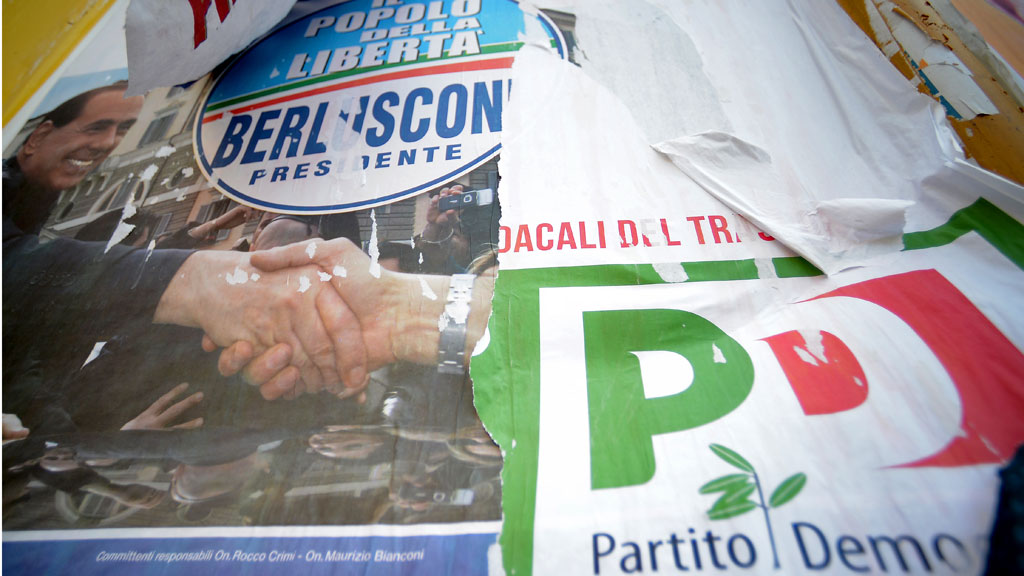Italian elections ‘game changer’ for the euro
After inconclusive election results which saw a rise in support for anti-austerity parties, where does Italy go from here and what does it mean for the rest of Europe?
Before the election, commentators were speculating that without a majority government Italy would find itself in “political chaos”.
In fact, Paola Subacchi, an international economist at the Chatham House think tank in London, warned in an article entitled Last Chance Saloon for Italy that a “solid working majority in Italy’s parliament is required to lead the country through the present difficult phase and restore international credibility”.
Dr Subacchi, a former student of the outgoing Italian prime minister, Mario Monti, added: “A confidence crisis in Italy would also seriously impact the stability of the eurozone and further erode support for the euro.”
Italian electors have now cast their votes, and they are not what Dr Subacchi was hoping for.
‘Game changer’
Italy’s public debt is higher than anywhere else in the eurozone and it has long been on the area’s watchlist, because it is seen as “too big to fail” – at least, not without major repercussions. For this and other reasons, Dr Subacchi believes the inconclusive Italian election results are a “significant game changer for the euro” that could lead to Italy leaving the single currency, with other eurozone countries striving for political union to complement their monetary union.
It would be a disaster for the country, but I can see that for other European countries it could be quite a palatable solution. Dr Paola Subbachi, economist, on Italy leaving the euro
“It would be a disaster for the country, but I can see that in the eye of other European countries it could be quite a palatable solution rather than continuing to deal with another country that is so politically unreliable,” she told Channel 4 News.
The centre-left and centre-right blocs, led by Pier Luigi Bersani and Silvio Berlusconi respectively, did not win enough votes to govern on their own – no doubt squeezed by the success of the comic Beppe Grillo, whose anti-politics and anti-austerity message captured many people’s imaginations.

Driven out
But Mr Berlusconi, who also railed against the budget cuts Italy is pushing through as it seeks to convince Germany it is serious about reducing its debts, is now a political force again, despite being driven out of office in November 2011 with the debt crisis swirling around him.
The technocratic Mr Monti, who has been overseeing these cuts, fared miserably.
Mr Berlusconi has hinted that he might be open to a deal with Mr Bersani, but the Reuters news agency reports that it is “all but impossible that Bersani would team up in a ‘grand coalition’ with his arch-enemy Berlusconi”.
Before the poll Mr Bersani said he could forge an alliance with Mr Monti, while Beppe Grillo’s Five Star Movement has shot down the prospect of an arrangement with Mr Berlusconi, who has been blamed for mismanaging the economy, as well as being accused of having sex with an under-age prostitute.
Loadsamoney
Mr Berlusconi’s relative success at the ballot box may owe something to his offer to ease the pain of people stung by a property tax – if necessary, with money from his own billionaire pockets.
Dr Subacchi believes Italy’s current plight is reminiscent of Greece in May 2012, when the radical left, standing on an anti-austerity platform, managed to deprive the establishment parties of a majority.
This led to fresh elections in June and the formation of a government by Antonis Samaras, leader of the centre-right New Democracy party.
Dr Subacchi told Channel 4 News there was scope for a “grand coalition” between centre-left and centre-right, “which I think will collapse after a few months”.
These blocs would negotiate a new voting system to ensure future elections were not deadlocked and voters would probably go to the polls again in September.
‘Out of action’
Dr Subacchi said it was impossible to call the result, with no guarantees that Mr Bersani would still be at the helm and uncertainty around Mr Berlusconi’s future prospects.
“Six months ago Berlusconi was completely out of the action, but he is very charismatic and controls a lot of the media,” she said.
Ireland, Portugal, Greece and Spain have received bailouts to keep them in the euro, but as the eurozone’s third biggest economy – after Germany and France – it is difficult to see how Italy could be helped in the same way if its borrowing costs become unsustainable.
These costs shot up today after the election results, but they are far below their peak. The markets may be unsettled by the uncertainty in Italy, but Rome is a long way from Armageddon.